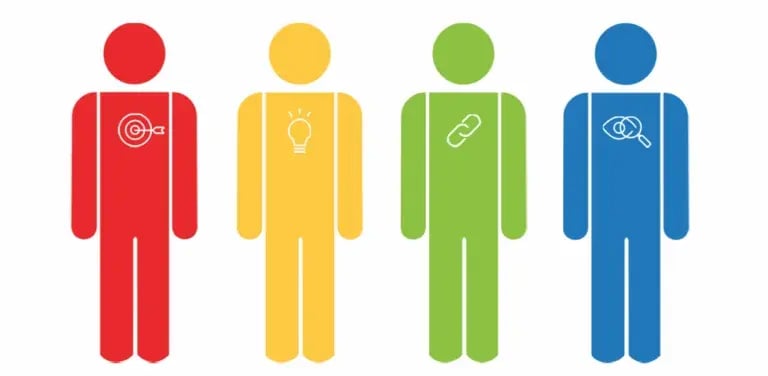The 4 DISC test colours explained
The different behavioural styles are sometimes difficult to remember and easy to confuse. Many people are visually oriented. That is why colours are linked to the DISC styles. For example, when someone has done DISC analysis in the past, they often don’t remember which behavioural styles were predominant, but the colours are remembered. The colours associated with the DISC behavioural styles are not chosen at random. They actually match the characteristics of the different styles.

Red, yellow, green and blue colour psychology
We quickly associate colours with certain emotions; it can even influence our emotions. According to colour psychology, what do the DISC colours stand for?
Red: Strength and warmth
This colour is intense, powerful and vibrant. The colour has great impact on a person’s personality. Brands with a red logo want to exude power, for example Red-bull or Coca-Cola.
Yellow: Happiness and fun
This colour represents cheerfulness and symbolises optimism, friendship and wealth. It triggers positive feelings in many. Not surprising then that MacDonalds and Zwitsal have yellow logos.
Green: Nature and balance
The green colour arouses positive and balanced emotions. Green stands for self-preservation, nature and growth. Many ecological or environmentally conscious companies therefore choose a green logo, for example WeCycle or FSC.
Blue: Calmness and reliability
The blue colour has a calming effect on your emotion. The colour symbolises wisdom and authority. Government agencies like to radiate authority and trust, which is why you also see the colour blue in logos of the police and the central (Dutch) government.
Personality colours
The colours have been translated into the DISC behavioural styles. The characteristics of the DISC behavioural styles are also matched with the emotions that arise with the colours. This is why the DISC model is sometimes called ‘personality colours’.
Want to know more about the DISC profiles and the characteristics associated with them?
What behavioural styles are there in DISC?
There are four behavioural styles within the DISC model: Dominance, Influence, Stability and Conformism.
Why are colours linked to the DISC styles?
Colours are linked to the DISC styles because many people are visually oriented and colours are easier to remember than the behavioural style names themselves.
How can I determine my own DISC profile?
You can only determine a concrete DISC profile by taking a DISC test, available at DISC Boulevard
